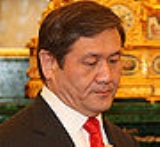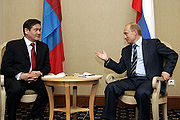
Nambaryn Enkhbayar
Encyclopedia

Mongolia
Mongolia is a landlocked country in East and Central Asia. It is bordered by Russia to the north and China to the south, east and west. Although Mongolia does not share a border with Kazakhstan, its western-most point is only from Kazakhstan's eastern tip. Ulan Bator, the capital and largest...
n political figure. He was the Prime Minister of Mongolia
Prime Minister of Mongolia
The Prime Minister of Mongolia is the highest member of the Mongolian government's executive arm, and heads the Mongolian cabinet. The Prime Minister is appointed by Parliament, and can be removed by a vote of no confidence.-Powers:...
from 2000 to 2004, the Speaker of Parliament from 2004 to 2005, and the President of Mongolia
President of Mongolia
The President of Mongolia is the head of state of Mongolia. The Constitution of Mongolia implements a parliamentary system, so while much of the President's role is ceremonial, he or she does wield significant political power.-Election:...
from 2005 to 2009. He was defeated by opposition leader Tsakhiagiin Elbegdorj in the 2009 presidential election
Mongolian presidential election, 2009
Presidential elections were held in Mongolia on 24 May 2009. It was contested between incumbent Nambaryn Enkhbayar, supported by the Mongolian People's Revolutionary Party, and Tsakhiagiin Elbegdorj, who had support of the Democratic Party and the opposition parties. Elbegdorj declared himself...
, becoming the first President of Mongolia to fail to be re-elected to a second term.
Education and early life
Born on 1 June 1958 in Mongolia's capital city Ulan Bator, Nambaryn Enkhbayar graduated from secondary school in 1975 and went on to study at the Moscow Institute of LiteratureMaxim Gorky Literature Institute
The Maxim Gorky Literature Institute is a higher education institute in Moscow. It is located at 25 Tver Bulvar in Central Moscow.It was founded in 1933 on the initiative of Maxim Gorky, and received its current name at Gorky's death in 1936....
in 1980 where he earned an undergraduate degree in literature and language, and also attended English language courses at Leeds University
University of Leeds
The University of Leeds is a British Redbrick university located in the city of Leeds, West Yorkshire, England...
in England
England
England is a country that is part of the United Kingdom. It shares land borders with Scotland to the north and Wales to the west; the Irish Sea is to the north west, the Celtic Sea to the south west, with the North Sea to the east and the English Channel to the south separating it from continental...
in 1985 to 1986. It was in Britain that Enkhbayar encountered uncensored media for the first time and was particularly stunned by news coming out of the Soviet Union
Soviet Union
The Soviet Union , officially the Union of Soviet Socialist Republics , was a constitutionally socialist state that existed in Eurasia between 1922 and 1991....
. Upon moving back to Ulan Bator, Enkhbayar worked for the Mongolian Writer's Union from 1980 to 1990 as a translator-editor, a secretary general and a vice president and he translated Buddhist
Buddhism
Buddhism is a religion and philosophy encompassing a variety of traditions, beliefs and practices, largely based on teachings attributed to Siddhartha Gautama, commonly known as the Buddha . The Buddha lived and taught in the northeastern Indian subcontinent some time between the 6th and 4th...
teachings into Mongolian, and finally reached the top post at the Association of Mongolian Writers by 1990, the same year in which the Mongolian People's Revolutionary Party
Mongolian People's Revolutionary Party
The Mongolian People's Party formerly the Mongolian People's Revolutionary Party is an ex-communist political party in Mongolia. The party is abbreviated MPP in English and ' in Mongolian...
relinquished control and multiparty elections were held that July for the first time in Mongolian history. Enkhbayar, a Mongolian People's Revolutionary Party
Mongolian People's Revolutionary Party
The Mongolian People's Party formerly the Mongolian People's Revolutionary Party is an ex-communist political party in Mongolia. The party is abbreviated MPP in English and ' in Mongolian...
(MPRP) member, became part of the new political order almost immediately, serving as a vice chair of a government arts committee for the first two years of democratic rule.
Political career
Enkhbayar was elected as a member of the State Great Khural (the Mongolian parliament) in 1992 and served as Minister of Culture from 1992 to 1996. He left the latter post when the MPRP lost the 1996 general election, ending its run as the longest ruling political party in the world. In 1997, he became the leader of the opposition post-communist Mongolian People's Revolutionary PartyMongolian People's Revolutionary Party
The Mongolian People's Party formerly the Mongolian People's Revolutionary Party is an ex-communist political party in Mongolia. The party is abbreviated MPP in English and ' in Mongolian...
with backing of old leaders of the party such as Gombosuren and Dash-Yondon. He led his party to victory in 2000 elections, in a landslide election, winning 72 out of 76 seats. On 26 July 2000, he was unanimously elected as the prime minister in the Parliament. He is credited with the revitalization of his party. Now in control of the parliament again, Enkhbayar began an ambitious project to improve the infrastructure of his country and encourage foreign investment. These included the new Millennium Road, the first to traverse Mongolia's 600000 square miles (1,553,992.9 km²) territory from east to west, and an agreement with a Canadian group Ivanhoe Mines led by "Toxic Bob" Robert Friedland
Robert Friedland
Robert Martin Friedland is an international financier and businessman. Since the early 1980s, he has specialized in securing funding for the exploration and development of mineral and energy resources and advanced technology ventures...
to begin gold mining. His party lost almost half of its seats in the 2004 election to the Motherland Democratic Coalition
Motherland Democratic Coalition
Motherland Democratic Coalition was a coalition of political parties in Mongolia for the 2004 legislative elections.Member parties were:* Democratic Party* Motherland Party* Civic Will Party...
, and in August 2004, he entered a coalition
Coalition
A coalition is a pact or treaty among individuals or groups, during which they cooperate in joint action, each in their own self-interest, joining forces together for a common cause. This alliance may be temporary or a matter of convenience. A coalition thus differs from a more formal covenant...
with opposition parties and became the Speaker of Parliament.
While serving as Prime Minister, without disclosing the details to the Mongolian public, Enkhbayar suddenly settled Mongolia's controversial debt to the former Soviet Union
Soviet Union
The Soviet Union , officially the Union of Soviet Socialist Republics , was a constitutionally socialist state that existed in Eurasia between 1922 and 1991....
.
He entered the race for president in the spring of 2005, and campaigned by helicopter to cover the sparsely populated country, where even permanent settlements are often spaced miles away from one another. Later that year, he welcomed U.S. President George W. Bush
George W. Bush
George Walker Bush is an American politician who served as the 43rd President of the United States, from 2001 to 2009. Before that, he was the 46th Governor of Texas, having served from 1995 to 2000....
for an official visit, the first one ever of a sitting U.S. president to the country. In the 22 May 2005 presidential election
Mongolian presidential election, 2005
The 2005 Mongolian presidential election was held in Mongolia on 22 May 2005. The election was won by Nambariin Enkhbayar of the Mongolian People's Revolutionary Party , who took over half of the vote.-Background:...
, Enkhbayar was elected to succeed Natsagiin Bagabandi with 53.4 percent of the vote. His main rival, Mendsaikhany Enkhsaikhan of the Mongolian Democratic Party, collected 20 percent of the vote.
2008 state of emergency
After the 2008 post-election riots and the imposition of a four-day state of emergency by Enkhbayar, he and the MPRP came under heavy criticism from the relatives of those killed during the riots, and from parts of the opposition. Most of this criticism was related to police brutality: five people had been killed in the riots, and the deaths of four of these people by gunshot wounds raised concerns over unnecessary and excessive police violence and later led to charges of murder against involved policemen. Another point of contention was the state of emergency itself, most notably the shutdown of all non-state run TV stations.On the other hand, Erdeniin Bat-Üül
Erdeniin Bat-Üül
Erdeniin Bat-Üül is a prominent Mongolian politician from the Democratic Party.-Early life and career:E. Bat-Üül was born in Ulaanbaatar on July 1, 1957. His father was Sengiin Erdene, one of Mongolia's most well-known authors. In 1975 he completed Ulaanbaatar's High School No. 1, and in 1981 he...
, a prominent DP figure, in an interview on July 4 called the imposition of a state of emergency "the right thing to do at the time". He criticized Enkhbayar for showing poor leadership at a time when "the city was burning".
2009 Presidential elections defeat
In the 2009 presidential election, Enkhbayar was narrowly defeated by Tsakhiagiin Elbegdorj.External links
- President of Mongolia Official site
|-
|-
|-

